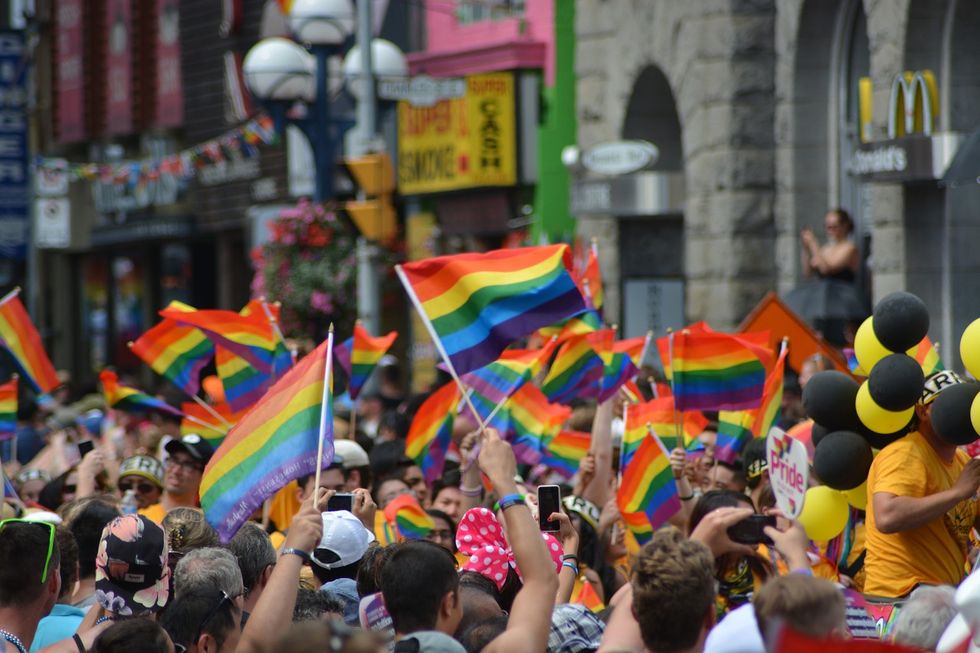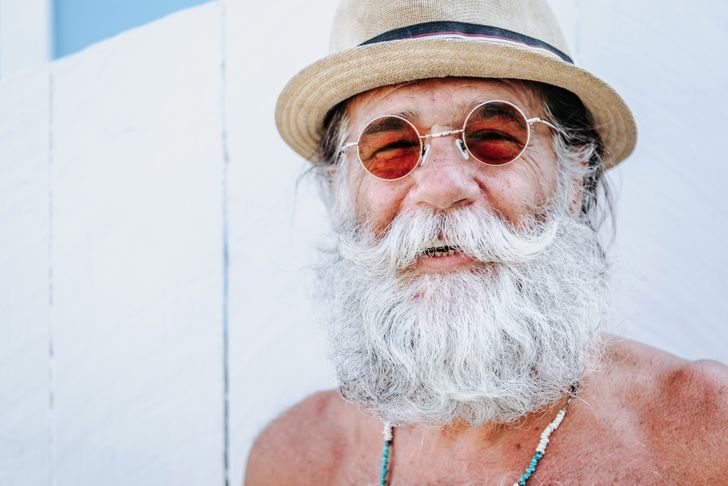LGBTQ+: An acronym used to describe the community consisting of Lesbian, Gay, Bisexual, Transgendered, and Queer individuals. The + is included as a way to represent anyone who identifies as something other than heterosexual or cisgender (when gender identity aligns with sex assignment at birth) but who does not fall under the five most common labels, such as those who indentify as Intersex, Demisexual, Pansexual, Nonbinary, or Asexual.
In case you've been living under a rock for the past decade, LGBTQ+ individuals are considered a minority, and those who identify as such often face persecution for the way their brains are wired from birth; the most unfortunate LGBTQ+ individuals are shamed, ostracized, and harassed by their own family, friends, or immediate surrounding community.
This mental, emotional and at times physical abuse is one of the leading causes of suicide or attempted suicide among LGBTQ+ youth, who are almost five times more likely to attempt suicide than their heterosexual peers, and on top of that, LGBTQ+ youth who come from highly rejecting families are 8.4 times as likely to have attempted suicide as LGBTQ+ peers who reported no or low levels of family rejection (From thetrevorproject.org).
I've considered myself an advocate of the LGBTQ+ movement since I was in middle school, but it wasn't until my freshman year of university that I fully realized my identity as queer and nonbinary; this wouldn't have been possible without an extensive online support network of friends and other LGBTQ+ youth, who often becoming something of a family for one another when their own relatives fail to provide the love and support they need as they process their identities.
One of the main things I learned being surrounded by all these young people struggling with their identities and finding acceptance for who they are or who they love was that the rejection, abuse, and persecution I mentioned above is a lot more common than you might think.
After the Supreme Court legalized gay marriage nationwide in 2015, the assumption that the United States had conquered homophobia was widespread among many heterosexual people and even some LGBTQ+ individuals who were content with their lives.
However, this notion is far from the truth; in a legal sense, the United States had grown one step closer to ending LGBTQ+ discrimination. But on the individual level homophobia still runs rampant, often making the lives of LGBTQ+ youth surrounded by it miserable. It reaches as high as political figures charged with running our country; current Republican candidate for Alabama state senate Roy Moore has gone on record stating his belief that 9/11 was God's punishment for homosexual behaviors, which in his opinion, should be illegal.
Whether or not you consider yourself to be an advocate or a member of the LGBTQ+ community, that should offend patriots, Christians, and anyone affected by the tragedy of that day for its sheer absurdity.
I have a good number of friends who struggle with self-expression, confidence, and acceptance because of their families, the people who promised to always love them and care for them, look down on the way they were born. These family members belittle and insult their own children because of their ignorance and closed-mindedness.
According to a study of LGBTQ+ Americans conducted by the PEW Research Center, over 50% of those surveyed were subject to slurs, insults, or derogatory jokes, and nearly 40% were rejected by a friend or family member for their sexuality or identity at some point in their life. Sometimes these numbers are hard to picture in the context of your life, but if you have friends who identify as LGBTQ+, understand this: that second statistic deems it plausible that 2 out of every 5 LGBTQ+ individuals have experienced family rejection.
One of my friends, a transgendered male, attempted suicide four times before the age of 18. His mother refused to use his preferred pronouns. Another, an asexual woman who struggles with depression, anxiety, and schizophrenia, has attempted suicide more than five times, several of which have put her in the hospital. She lacks a support system because her family insists her identity is "just a phase." Yet another friend, who identifies as demisexual and panromantic, has twice attempted to take her life, and regularly considers suicide as a result of her severe depression. Her family continues to complain that she doesn't have a boyfriend.
So where is my role in all this? That's the problem: I don't belong in this story.
When I came out to my family around a year ago, they congratulated me and cheered me on. They asked polite questions to clarify anything they were confused about. They immediately began trying to use my preferred name and pronouns. My stepmom bought me a chest binder last Christmas. I happen to have been raised in an extremely liberal city, surrounded by liberal, educated and accepting family members who made the coming out process easy and rewarding instead of stressful and painful. I have never considered suicide with any amount of sincerity because I feel loved and welcome in my home every time I visit; it's an amazing experience I wish every LGBTQ+ person had the chance to be a part of.
Because I won this amazing jackpot in the family lottery, so to speak, I feel guilty every time I hear another one of my peers recount an argument they've had, an insult they've been subjected to, a loneliness and isolation that they feel. I can't adequately empathize with them because I've never stood in their shoes. Since the majority of these friends are long-distance, I can't offer a hand to hold or a shoulder to cry on when they need it most.
There is almost nothing I can do for these young people who feel as though they have nowhere to turn, and it crushes me to feel powerless in these situations when the solution is so simple.
I don't want this to be a pity party because I'm the last person in this story who needs your pity. If anything, this should be a call to action: if you have a friend who identifies as LGBTQ+, talk to them. Ask how they're doing. Give them hugs, and hold their hands.
Encourage them to reach out if they're struggling; they might need reminders that talking with them isn't a burden on you. Reassure them that they are loved, respected and cared for by you at the very least. Regardless of your stance on the matter, these simple actions can save a friend's life, and that's a cause we can all stand behind.



 women in street dancing
Photo by
women in street dancing
Photo by  man and woman standing in front of louver door
Photo by
man and woman standing in front of louver door
Photo by  man in black t-shirt holding coca cola bottle
Photo by
man in black t-shirt holding coca cola bottle
Photo by  red and white coca cola signage
Photo by
red and white coca cola signage
Photo by  man holding luggage photo
Photo by
man holding luggage photo
Photo by  topless boy in blue denim jeans riding red bicycle during daytime
Photo by
topless boy in blue denim jeans riding red bicycle during daytime
Photo by  trust spelled with wooden letter blocks on a table
Photo by
trust spelled with wooden letter blocks on a table
Photo by  Everyone is Welcome signage
Photo by
Everyone is Welcome signage
Photo by  man with cap and background with red and pink wall l
Photo by
man with cap and background with red and pink wall l
Photo by  difficult roads lead to beautiful destinations desk decor
Photo by
difficult roads lead to beautiful destinations desk decor
Photo by  photography of woman pointing her finger near an man
Photo by
photography of woman pointing her finger near an man
Photo by  closeup photography of woman smiling
Photo by
closeup photography of woman smiling
Photo by  a man doing a trick on a skateboard
Photo by
a man doing a trick on a skateboard
Photo by  two men
two men  running man on bridge
Photo by
running man on bridge
Photo by  orange white and black bag
Photo by
orange white and black bag
Photo by  girl sitting on gray rocks
Photo by
girl sitting on gray rocks
Photo by  assorted-color painted wall with painting materials
Photo by
assorted-color painted wall with painting materials
Photo by  three women sitting on brown wooden bench
Photo by
three women sitting on brown wooden bench
Photo by 
 Photo by
Photo by  Photo by
Photo by  Photo by
Photo by  Photo by
Photo by 


 people sitting on chair in front of computer
people sitting on chair in front of computer



 all stars lol GIF by Lifetime
all stars lol GIF by Lifetime two women talking while looking at laptop computerPhoto by
two women talking while looking at laptop computerPhoto by  shallow focus photography of two boys doing wacky facesPhoto by
shallow focus photography of two boys doing wacky facesPhoto by  happy birthday balloons with happy birthday textPhoto by
happy birthday balloons with happy birthday textPhoto by  itty-bitty living space." | The Genie shows Aladdin how… | Flickr
itty-bitty living space." | The Genie shows Aladdin how… | Flickr shallow focus photography of dog and catPhoto by
shallow focus photography of dog and catPhoto by  yellow Volkswagen van on roadPhoto by
yellow Volkswagen van on roadPhoto by  orange i have a crush on you neon light signagePhoto by
orange i have a crush on you neon light signagePhoto by  5 Tattoos Artist That Will Make You Want A Tattoo
5 Tattoos Artist That Will Make You Want A Tattoo woman biting pencil while sitting on chair in front of computer during daytimePhoto by
woman biting pencil while sitting on chair in front of computer during daytimePhoto by  a scrabbled wooden block spelling the word prizePhoto by
a scrabbled wooden block spelling the word prizePhoto by 
 StableDiffusion
StableDiffusion
 StableDiffusion
StableDiffusion
 StableDiffusion
StableDiffusion









